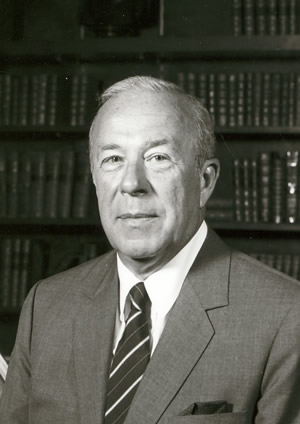
(December 13, 1920 - February 6, 2021)
George Pratt Shultz was born in New York City on December 13, 1920 and grew up in Englewood, N.J. He earned a B.A. in economics from Princeton University in 1942 and his Ph.D. in industrial economics from MIT in 1949. From 1942-45 he served in the U.S. Marine Corps.
Mr. Shultz held multiple senior government positions including: senior staff economist on the President’s Council of Economic Advisors under President Eisenhower; Secretary of Labor, Director of the Office of Management and Budget, Secretary of the Treasury, and Chairman of the Council on Economic Policy under President Nixon; and, Chairman of the President’s Economic Policy Advisory Board and Secretary of State under President Reagan.
During his tenure as Secretary of State, he played a key role in implementing a foreign policy that led to the successful conclusion of the Cold War, and the development of strong relationships between the United States and the countries of the Asia-Pacific region including China, Japan, and the ASEAN countries.
Mr. Shultz also served in the private sector as the President and Director of the Bechtel Group, Inc. from 1974-1982, later returning as the Director and Senior Counselor following his service in the Reagan Administration. At various times he taught or served as a Fellow at MIT, Stanford, and the University of Chicago Graduate School of Business where he also served as Dean.
He served as the chairman of the Governor of California’s Economic Advisory Board and the J. P. Morgan Chase International Council. He was Advisory Council Chair of the Precourt Institute for Energy Efficiency at Stanford University, the Thomas W. and Susan B. Ford Distinguished Fellow at the Hoover Institution, and he served on the boards of directors of Accretive Health and Fremont Group.
Mr. Shultz’s publications include: Turmoil and Triumph: My Years as Secretary of State (1993), Economic Policy Beyond the Headlines (1977), Workers and Wages in the Urban Labor Market (1970), Guidelines, Informal Controls, and the Marketplace (1966), Strategies for the Displaced Worker: Confronting Economic Change (1966), Management Organization and the Computer (1960), Labor Problems: Cases and Readings (1953), The Dynamics of a Labor Market (1951), and Pressures on Wage Decisions (1950).
In January 1989, Mr. Shultz was awarded the Medal of Freedom, the nation’s highest civilian honor. He was also a recipient of the Seoul Peace Prize (1992), the West Point Sylvanus Thayer Award (1992), the Eisenhower Medal for Leadership and Service (2001), the Reagan Distinguished American Award (2002), and The Association for Diplomatic Studies and Training’s Ralph Bunche Award for Diplomatic Excellence (2002). Other honors awarded in 2002 included the Elliot Richardson Prize for Excellence and Integrity in Public Service, The James H. Doolittle Award, and the John Witherspoon Medal for Distinguished Statesmanship. The George Shultz National Foreign Affairs Training Center in Arlington, Virginia was dedicated in a ceremony on May 29, 2002. Mr. Shultz was named a Distinguished Fellow of the American Economic Association in 2005. He received The American Spirit Award from The National World War II Museum in 2006.
In 2007, Mr. Shultz received, together with ASMEA Founding Chairman Prof. Bernard Lewis, the "Scholar Statesman" award from the Washington Institute for Near East Policy.
Mr. Shultz held honorary degrees from Notre Dame, Columbia, Loyola, Pennsylvania, Rochester, Princeton, Carnegie-Mellon, CUNY, Yeshiva University, the Weizmann Institute of Science, Baruch College of New York, the Hebrew University of Jerusalem, Tbilisi State University in the Republic of Georgia, Technion, and Keio University in Tokyo.


